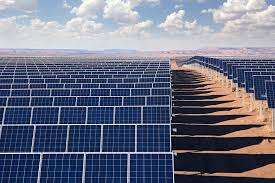In a significant stride towards energy independence and a greener future, Botswana is poised to welcome a new 100MW solar power plant in Jwaneng. Developed by Sinotswana Green Energy, a consortium comprising Chinese and local companies, the project marks a pivotal moment in the country’s energy landscape.
Historically, Botswana has relied heavily on coal for its electricity generation. However, the government has recognized the imperative to diversify its energy sources and reduce its carbon footprint. A strategic goal of achieving 50% renewable energy penetration by 2036 has been set, and the Sinotswana Green Energy project is a tangible demonstration of this commitment.
The 100MW solar power plant, valued at $78.3 million, is expected to be operational by the end of 2025. The consortium secured funding from a combination of local and international sources, reflecting the growing interest in renewable energy projects in the region.
President Mokgweetsi Masisi has expressed his enthusiasm for the project, emphasizing its role in driving national development and transitioning Botswana towards a more sustainable energy future. The project is anticipated to create numerous jobs during construction and operation, contributing to economic growth and local investment opportunities.
Beyond the economic benefits, the Sinotswana Green Energy project will have a significant environmental impact. By generating clean, renewable electricity, the plant will help reduce Botswana’s carbon emissions and contribute to global efforts to combat climate change.
The project’s capacity of 100MW represents a substantial addition to Botswana’s existing energy mix, which is currently dominated by coal-fired power plants. This marks a significant step towards diversifying the country’s energy sources and reducing its reliance on fossil fuels.
Looking ahead, Botswana is exploring other renewable energy initiatives, including battery storage systems and additional solar power projects. These investments are essential for ensuring a stable and reliable energy supply while meeting the growing demand for electricity.
International partnerships will play a crucial role in supporting Botswana’s renewable energy aspirations. By attracting foreign investment and expertise, the country can accelerate its transition to a cleaner energy future and secure its place in the global energy landscape.
One of the key challenges facing Botswana’s renewable energy development is the intermittent nature of solar power. To address this issue, the government is exploring the integration of battery storage systems. These systems can store excess solar energy during peak production periods and release it during periods of low solar generation, ensuring a more consistent and reliable power supply.
HAVE YOU READ? Malawi Secures USTDA Grant for 50MW Wind Farm Breakthrough
Furthermore, Botswana is considering the potential of developing additional solar power projects in other regions of the country. By expanding its renewable energy capacity, Botswana can reduce its dependence on imported fossil fuels and enhance its energy security.
The Sinotswana Green Energy project is a testament to Botswana’s commitment to sustainable development and energy independence. As the country continues to invest in renewable energy, it is positioning itself as a leader in the region and a model for other nations seeking to transition away from fossil fuels. By embracing solar power and other renewable technologies, Botswana is paving the way for a brighter, more sustainable future.













